|
|

Prince Tony's
'TR International' productions, probably more 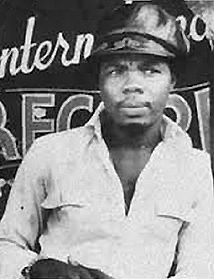 than the
work of many other producers, popularised the art of Jamaican deejays,
Big Youth and U Roy in particular, and brought them to world wide prominence in the second half of the seventies. than the
work of many other producers, popularised the art of Jamaican deejays,
Big Youth and U Roy in particular, and brought them to world wide prominence in the second half of the seventies.
It is generally agreed that Tony Robinson's first production was Cassa Boo Boo from the underrated Uziah 'Count Sticky'
Thompson, released in 1969 in Jamaica on the Soul Shack & Top Of The Pops label and in the
UK on Trojan's Grape subsidiary. Sticky introduced the record in fine style with "Here comes
the man Prince Tony..." and that man Prince Tony continued to keep on coming throughout the seventies.
"Deejay thing used to go and come... it wasn't steady."
He went on to release a selection of hit deejay singles on his own High School (International) label from talk over luminaries
including Dennis Alcapone with Majesty In Red and Rub Up A Daughter, Dillinger with Fat Beef Skank and,
most notably of all, 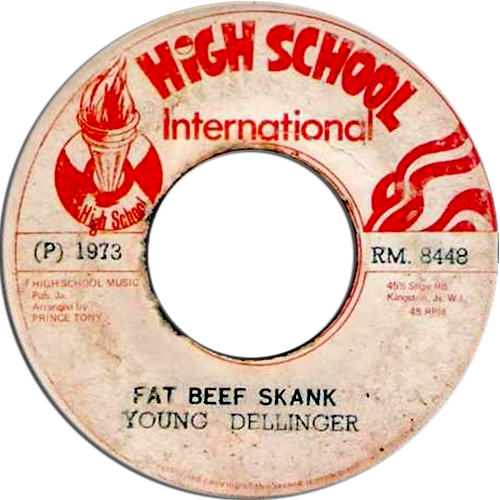 on a series of smashes with Winston Scotland. A number of these, such as My Little Filly and
On The Track, were sufficiently successful to be released in the UK through Trojan and Pama in London.
Buttercup, a superb version to Prince Tony's cut to You Don't Care/You'll Want Me Back, after its initial
release on Pama's Punch subsidiary, was then licensed to Philips, a major label, for UK release in 1972.
It inexplicably failed to cross over into the National Charts. on a series of smashes with Winston Scotland. A number of these, such as My Little Filly and
On The Track, were sufficiently successful to be released in the UK through Trojan and Pama in London.
Buttercup, a superb version to Prince Tony's cut to You Don't Care/You'll Want Me Back, after its initial
release on Pama's Punch subsidiary, was then licensed to Philips, a major label, for UK release in 1972.
It inexplicably failed to cross over into the National Charts.
Prince Tony had a real feel for deejay records, or versions, and his records were not only extremely well produced but also
very successful as he later recounted to Carl Gayle:
"Me is one of the man who support version. Me tell you say me a make money out of talking... all my money come from talking."
"Here comes the brother called Slim Smith..."
Winston Scotland's Quick And Slick used Bunny Striker Lee's Everybody Needs Love rhythm to great effect and
Lee 'Scratch' Perry had given 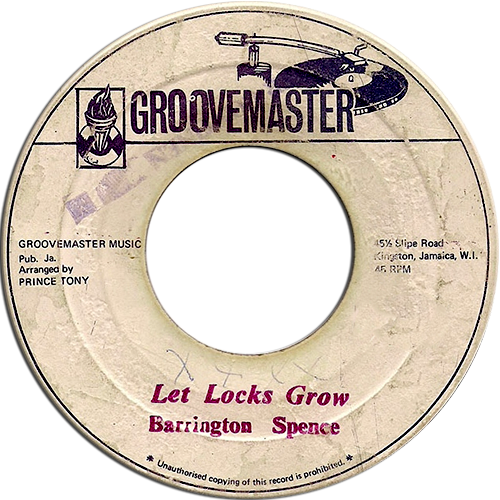 Prince Tony a cut of Dave Barker's What A Confusion (aka Earthquake from both
U Roy and The Upsetters rhythm) which Tony utilised to voice Arab And Israelite with Roman Stewart. However, in 1975 he
versioned over Scratch's Curly Locks as Let Locks Grow with Barrington Spence. Prince Tony was promoting the
career of this youthful vocalist at the time. Scratch and Junior Byles hit back with Dreader Locks. Prince Tony a cut of Dave Barker's What A Confusion (aka Earthquake from both
U Roy and The Upsetters rhythm) which Tony utilised to voice Arab And Israelite with Roman Stewart. However, in 1975 he
versioned over Scratch's Curly Locks as Let Locks Grow with Barrington Spence. Prince Tony was promoting the
career of this youthful vocalist at the time. Scratch and Junior Byles hit back with Dreader Locks.
"Prince Tony you're a phoney... gonna ride you like a pony" but Let Locks Grow was a considerable hit and the
deejayed version from Big Youth, House Of Dreadlocks, was an even bigger seller.
From his headquarters at Prince Tony's International Record Mart at 45 Slipe Road, Tony began to release records on the
TR International label. An early long player from Slipe Road, Dread Locks Dread from Big Youth, was subsequently
released in the UK on Klik where it sold "like a forty five". The purists might have moaned that it was the "beginning of the
end of the Youth's career" but it actually signalled the beginning of an entirely new and highly successful international
career for both Big Youth and Prince Tony.
"Tony's LP with Big Youth taught him that the combination of deejaying and dub music is the best course to take."
(Carl Gayle)
In 1975 a selection of singles for Bunny Striker Lee, including Joyful Locks and Gorgon Wise, 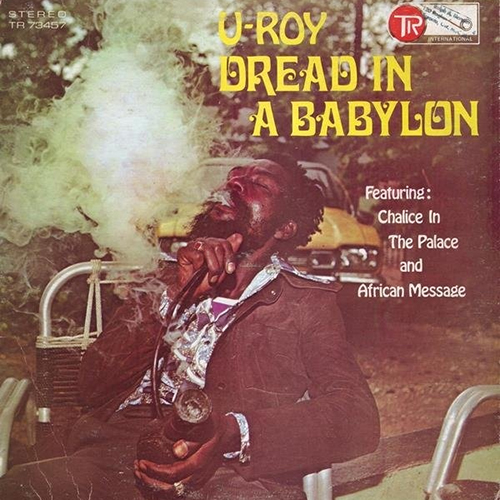 had placed U Roy
back on top of the peak and his Dread In A Babylon album, produced by Prince Tony that year, catapulted U Roy into the
international big time. had placed U Roy
back on top of the peak and his Dread In A Babylon album, produced by Prince Tony that year, catapulted U Roy into the
international big time.
Richard Branson's Virgin Records in London began to invest heavily in Jamaican music and U Roy, along with Prince Tony, was
one of their first signings. Dread In A Babylon was then released on Virgin in the UK and followed by Natty Rebel
the following year, Rasta Ambassador in 1977 and Jah Son Of Africa in 1978.
All sold in their thousands on the burgeoning international market but by 1980 the Virgin licensing agreement had run its
course and U Roy's Love Gamble/Love Is Not A Gamble, released on TR International in Jamaica and State Line in America,
included the vituperative, valedictory Mr Branson Ran Away With The Ransom.
However, their association had helped to introduce Jamaican music, and not only deejays, to a completely new audience.
Prince Tony's first album with The Gladiators, Trenchtown Mix Up released in 1976, was another big international hit on
Virgin and propelled The Gladiators to the forefront of Jamaican harmony groups. Their brief appearance in Jeremy Marre's
acclaimed Roots, Rock Reggae film featured Prince Tony advising Errol Thompson at the controls as the group harmonised
in Joe Gibbs' studio:
"Prince Tony and engineer Errol Thompson take hours just to get the balance they want. It's an instinct for the music."
(Roots, Rock Reggae)
The group's subsequent long players with Prince Tony, Proverbial Reggae in 1978 and Naturality in 1979, kept
them at the top of the game and their UK tour in the spring of 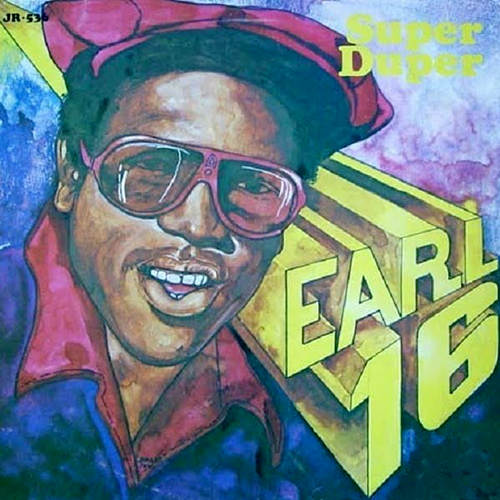 1978 was a resounding success. 1978 was a resounding success.
As the new decade dawned Prince Tony relocated to Miami and began to release albums in the dance hall style with up and coming
artists including Earl 16 with Super Duper, Barry Brown with Artist Of The 80's, Tony Tuff with
To Lovers Everywhere and Yellowman's Hotter Reggae on the Jam Rock Records label.
Very little has been heard from him since then, which is a great pity, as his work in the seventies helped to propel roots
rock reggae music to hitherto unimagined areas. Biographical details for Tony 'Prince Tony' Robinson are nearly non-existent
and he remains yet another one of the anomalies of reggae history where remarkably little is known about the pioneers who
achieved some of the greatest successes for the music, apart from their incredible hit records.
Sources:
Carl Gayle: Straight To The Nation's Head Black Music Volume 3, Issue 26 January 1976
Jeremy Marre: Roots, Rock, Reggae 1977
Jason & Ron
|
|
|



